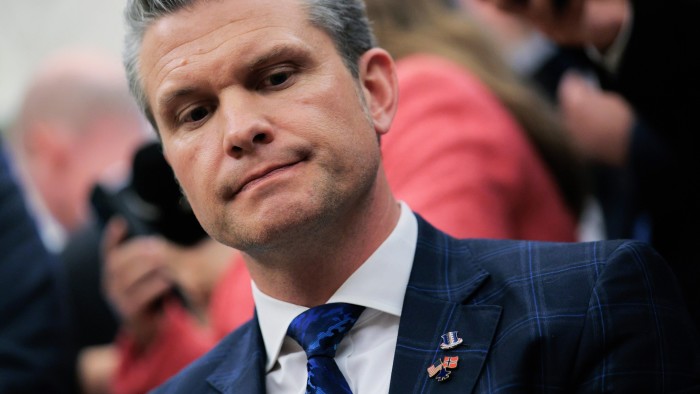Over lunch in late November, I was asked by the Washington ambassador of a big country whether it was normal for television anchors to be put in charge of the Pentagon. Donald Trump had just nominated Fox TV’s Pete Hegseth as defence secretary. The question was rhetorical. It was obvious to both of us — and to almost everyone else outside the Mar-a-Lago bubble — that Trump had lit the fuse on a political bomb. Running the Pentagon requires serious managerial experience, political dexterity and a sense of public service. To put it mildly, Hegseth lacks all three.
As the New Yorker’s Jane Mayer chronicled with characteristic precision, the thrice-married Hegseth had failed in his task of running two modest-sized non-profit groups for veterans. He was plagued by accusations of routine drunkenness, sexual harassment and negligence. Trump seems to have picked Hegseth because he looks the part and because he had used his weekend Fox show to lampoon Joe Biden’s alleged feminising of America’s military. His 2024 book, The War on Warriors, was well timed. The best for which the world could hope was that Hegseth would play Pentagon chief on TV and let the building get on with the real work.
It has been far worse than that. In addition to releasing highly sensitive military operational details on a Signal chat group that had accidentally added Jeffrey Goldberg, the editor of the Atlantic, Hegseth repeated his recklessness on another group chat that included his wife and brother. Even someone playing a cabinet principal on TV should know the meaning of “highly classified”. Hegseth has no clue. He could not resist bragging about the details and times of forthcoming US air strikes on Yemen’s Houthi militia.
The fallout over Signalgate was followed by a series of firings of Hegseth’s closest aides. Among other unauthorised disclosures was a planned briefing of Elon Musk about America’s China-war-fighting plans. Thankfully that had to be cancelled. Two days after resigning, another former long-standing Hegseth aide, John Ullyot, wrote in Politico that Hegseth had to go. Amid a blizzard of sophomoric errors, Hegseth insisted that he had not texted actual “war plans” on Signal — a “Clinton-esque non-denial denial” that only exacerbated the story, in Ullyot’s words.
Yet Trump is determined not to give the media a scalp within his first 100 days. Waving away Hegseth’s rumoured sacking, the president said: “Ask the Houthis how he [Hegseth] is doing”. We might also consult relatives of the dozens of Yemeni civilians who were reportedly killed in that performative-reeking strike.
I hesitate to wish for Hegseth’s removal because Trump is capable of putting in someone just as bad, or worse, like the far-right social media influencer, Laura Loomer. But the man is a menace to US national security. Imagine the effect on morale of America’s senior brass, several of whom Hegseth has fired — notably women and non-whites, including CQ Brown, the highly regarded chairman of the joint chiefs of staff. Hegseth insists he will not be distracted from his goal of putting the Pentagon “back into the hands of war fighters”. His definition of war fighter appears to be heterosexual white male.
Don’t misunderstand me. The Biden administration blitzed US federal departments with arbitrary DEI targets and speech codes. But the assumption that anyone non-white or female official is therefore a DEI hire is grotesque and dangerous. Hegseth has instructed staff to excise commemorations of African-American military heroes, to rename military bases after Confederate war generals, and a Salem-style cleaning out of books deemed to be DEI tainted. For example, 400 books were removed from the US Naval War College library, including Janet Jacobs’ Memoralizing the Holocaust and Maya Angelou’s I Know Why the Caged Bird Sings. The two copies of Hitler’s Mein Kampf remain on the shelves. So does Charles Murray’s The Bell Curve, which theorises about divergent racial IQs.
To recap, the Pentagon is in turmoil; the building’s morale is in tatters. But we are supposed to sleep more soundly at night because America’s warrior caste has been protected from reading a novel by a black woman. They can be trusted to risk their lives in battle but are apparently too fragile to handle literature about racism.
Here is the biggest tell: Hegseth reportedly ordered his office to spend thousands of dollars to retrofit a room adjacent to the Pentagon briefing room into a make up studio for his TV appearances. I for one am not delighted that my tax dollars are helping to keep this buffoon tanned for his seemingly hourly Fox News hits. One day I’ll tell Swampians what I really think . . .
In the meantime, I’m turning to my wonderful colleague, Lucy Fisher, the FT’s tireless Whitehall editor and presenter of the Political Fix podcast. Lucy, I know you’ve been covering the Westminster pantomime but even by London’s recent standards people like Hegseth must seem a bit surreal. My question to you is whether Trump’s senior appointees are harming the US-UK military and intelligence-sharing relationship. How worried is America’s closest ally about what is going on?
Recommended reading
-
My column this week looked at one of Trump’s least incompetent principals, JD Vance, who is auditioning to be his heir. With Trump, the key skill is an ability to troll liberals, which Vance is expertly pulling off. In terms of governing, however, I deem the vice-president’s role to be “pure vandalism”.
-
Do also read my colleague Gideon Rachman on “Trump, Vance and the attack on American universities”. Gideon rightly calls out Trump for cynically instrumentalising the charge of antisemitism as a pretext for an assault on US higher education.
-
My colleague Alan Beattie is also a must-read on how Trump is discovering that the US is no longer indispensable. “The US does not have the aid, the technology or the market access to exert control over global trade the way it once did, and Trump’s erratic behaviour is rapidly increasing the probability that it never will,” he writes. Come for Alan’s withering analysis. Stay for bonus point usage of words such as “tergiversation” and “mesospheric”.
Lucy Fisher responds
Hegseth’s nomination certainly raised eyebrows among Nato allies back in November — and his actions haven’t confounded that reaction since. Perhaps the only Trump pick to rival him in astounding the western defence and security establishment was that of US director of national intelligence Tulsi Gabbard, accused of sympathising with Russia.
At first British officials were at pains to stress the resilience of the long-standing military links between the US and the UK, as well as the close integration of the two nations’ intelligence agencies. These “mil-to-mil” and deep state ties would endure regardless of the political personalities installed at the top of the respective organisations, the argument ran.
In recent weeks, however, the chorus of concern about hardening US positions on Ukraine and the Middle East have grown louder in the UK security establishment — at least behind closed doors. Grandees warn that both Nato and Five Eyes have to step up long-term planning to mitigate an unreliable Washington for the foreseeable future. But the consensus seems to be that this must be done quietly.
Given it will take years to build up UK — and even joint allied — capabilities deemed sufficient to replace reliance on the US, there is consensus about the need to avoid any moves that accelerate the schism. That means swerving public criticism of the likes of Hegseth, Gabbard, and of course Trump himself.
Your feedback
We’d love to hear from you. You can email the team on swampnotes@ft.com, contact Ed on edward.luce@ft.com and Lucy on lucy.fisher@ft.com, and follow them on X at @LOS_Fisher and @EdwardGLuce. We may feature an excerpt of your response in the next newsletter
Source link









